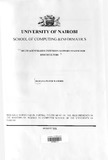| dc.description.abstract | Most of the medium- and small-scale horticultural farmers rely on public extension service
providers while large-scale farmers depend on private extension services. However, the current
number of extension service providers is inadequate to meet the needs of horticultural farmers.
HCDA offers limited specialized extension services for export crops and only in specific highconcentration
areas. Consequently, high-potential regions and farmers who produce for the local
market have not benefited from this service.
The purpose of this project is to address the extension service problem by identifying extension
services information required in horticulture, to design and build the Multi agent based extension
support system then test and evaluate the build multi agent based extension support system with
farmers
The information needs and searches for the farmer are related to 6 stages which were identified
as follows: (1) Deciding, (2) Seeding, (3) Planting, (4) Diseases, (5) Harvesting, packing and
storing, and (6) Marketing.
The stages were the bases for building the multi agent based extension support system for
horticulture. The system uses multi agents to perform search on behalf of the farmers and gives
results on the mobile phone.
An agent oriented methodology –Prometheus- was used in the analysis and design of the multiagent
based extension support system for horticulture. The implementation of the multi agents
was carried out using JADE and JADE-LEAP agent development kit. This framework opens the
way towards any kind of distributed multi agent systems, in which farmer agents may be
smoothly running on mobile devices and can communicate wirelessly with agents to access
information on extension services.
Test cases were run for the purpose of evaluating the built prototype with farmers. On average
91% of the farmers rated the functionality of the system excellent while on average 77% of the
farmers rated the overall system excellent in terms of easy to use.
The evaluation results also revealed that 87% of the farmers were motivated to use the program
repeatedly while 75% of the farmers indicated that they would recommend this program to other
farmers. Future improvements proposed are inclusion of GIS, data mining and language
functionalities. | en |

